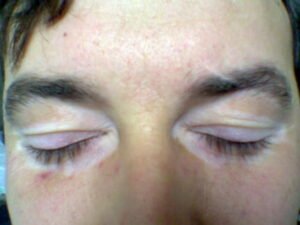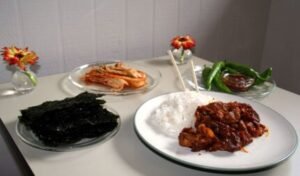Medically reviewed by Dr. Ramesh Gaddam, M.D. — Written by Sumalatha, D.N.H.E
Table of Contents
ToggleYes, you can eat curd (yogurt) and fish together. In many cuisines around the world, such as in Indian, Southeast Asian, and Mediterranean cuisines, it’s common to find dishes that combine yogurt-based sauces or marinades with fish.
For example, in Indian cuisine, you might find fish curries made with curd, or grilled fish marinated in a yogurt-based sauce. The combination of yogurt’s creamy texture and tangy flavor can complement the taste of fish quite well.
Health Benefits of eating Fish and Curd Together
Combining fish and curd (yogurt) in a meal can offer various health benefits due to the nutritional properties of both foods. Here are some potential health benefits of eating fish and curd together:

High-Quality Protein:
Both fish and curd are excellent sources of high-quality protein, which is essential for building and repairing tissues, supporting muscle health, and maintaining overall bodily functions.
Rich in Omega-3 Fatty Acids:
Many types of fish, such as salmon, mackerel, and trout, are rich in omega-3 fatty acids, particularly EPA and DHA.
These fatty acids have been linked to numerous health benefits, including improved heart health, reduced inflammation, and enhanced cognitive function.
Probiotics:
Curd is a fermented dairy product that contains beneficial probiotics, such as Lactobacillus and Bifidobacterium strains.
These probiotics can help promote a healthy balance of gut bacteria, which is important for digestive health, immune function, and nutrient absorption.
Calcium and Vitamin D:
Both fish and curd are good sources of calcium, a mineral essential for bone health, muscle function, and nerve transmission.
Additionally, some types of fish, such as salmon and sardines, are also rich in vitamin D, which plays a crucial role in calcium absorption and bone metabolism.
Nutrient Synergy:
Consuming fish and curd together can provide a synergistic combination of nutrients that work together to support overall health.
For example, the protein from fish can help enhance the absorption of calcium from curd, while the probiotics in curd may support gut health and improve nutrient absorption.
Weight Management:
Both fish and curd are relatively low in calories and can be part of a balanced diet for weight management.
The protein in fish and curd helps promote satiety and can help reduce appetite, making it easier to control calorie intake.
Heart Health:
The omega-3 fatty acids found in fish have been extensively studied for their beneficial effects on heart health.
Consuming fish regularly, along with probiotic-rich foods like curd, may help lower blood pressure, reduce triglyceride levels, and decrease the risk of cardiovascular diseases.
Overall, incorporating fish and curd into your diet can contribute to a well-rounded and nutritious eating pattern that supports overall health and well-being.
However, it’s essential to choose a variety of fish low in mercury and opt for plain curd without added sugars or unhealthy additives for the best health outcomes.
Side Effects of eating Fish and Curd together
Eating fish and curd together is generally safe for most people and is a common practice in many cuisines. However, for some individuals, particularly those with certain dietary restrictions or sensitivities, there could be potential side effects or discomfort. Here are a few considerations:

Digestive Issues:
Some people may experience digestive discomfort, such as bloating, gas, or indigestion, when consuming fish and curd together. This could be due to the combination of different proteins or fats in the foods.
Allergies or Sensitivities:
Individuals with allergies to either fish or dairy products (including lactose intolerance) should avoid consuming fish and curd together.
Allergic reactions can range from mild to severe and may include symptoms such as itching, swelling, hives, difficulty breathing, or anaphylaxis.
Curdled Curd:
Mixing certain types of fish with acidic ingredients like lemon juice or vinegar could cause curdling of the curd.
While this doesn’t pose any health risks, it might affect the texture and appearance of the dish.
High Fat Content:
Some types of fish, especially fatty fish like salmon, contain higher levels of fat.
Pairing them with curd, which can also be high in fat depending on the type and preparation, could lead to an overall high-fat meal, which might not be suitable for everyone, particularly those watching their fat intake for health reasons.
Dietary Restrictions:
Individuals following specific dietary regimens, such as certain types of therapeutic diets or religious dietary restrictions, may need to avoid consuming fish and curd together due to their respective dietary guidelines.
If you’re unsure about how your body will react to eating fish and curd together or if you have any specific dietary concerns, it’s best to consult with a healthcare professional or a registered dietitian for personalized advice.
They can provide guidance based on your individual health status, dietary needs, and any existing conditions or allergies.
Debunking the Fish and Curd Myth
In various cultures, there exists a myth suggesting that consuming fish and curd together can lead to adverse health effects. However, this notion lacks scientific backing and warrants clarification.

Myth Description:
The myth alleges that the combination of fish and curd can result in ailments such as skin diseases or digestive discomfort. It’s important to examine this claim in light of scientific evidence.
Scientific Perspective:
Contrary to the myth, both fish and curd are nutritious foods that can be safely consumed together or separately as part of a balanced diet.
Considerations:
Individuals with specific sensitivities or allergies to ingredients in fish or curd may experience adverse reactions.
For instance, lactose-intolerant individuals might face digestive issues with curd consumption, while those allergic to fish should avoid it altogether.
Preparation Impact:
While the preparation and combination of fish and curd in a dish may affect taste and texture, it does not inherently cause negative health outcomes.
Conclusion:
The notion that consuming fish and curd together is detrimental is unfounded.
As with any dietary decision, it’s crucial to consider individual preferences, dietary restrictions, and overall nutritional needs. Consulting with a healthcare professional or registered dietitian can offer personalized guidance on dietary choices.
Time gap between fish and curd
The idea of maintaining a time gap between consuming fish and curd is rooted in traditional beliefs and cultural practices, particularly in some South Asian cultures.

The rationale behind this practice is primarily based on concerns about digestion and potential interactions between different types of proteins.
But Science Doesn’t Back This Up
However, from a scientific perspective, there is no evidence to suggest that consuming fish and curd together or in close succession poses any health risks for the majority of people.
Both fish and curd are nutritious foods that can be part of a balanced diet when consumed together or separately.
Why Some Still Wait
That said, individuals with specific dietary sensitivities or digestive issues may choose to follow such practices based on their own experiences or cultural beliefs.
If you have concerns about the combination of fish and curd in your diet, it’s always a good idea to consult with a healthcare professional or registered dietitian for personalized advice tailored to your individual needs.
Does fish and curd cause Skin diseases?
For the majority of people, consuming fish and curd together is unlikely to cause skin diseases. Both fish and curd are nutritious foods that are generally safe to eat and are part of many healthy diets around the world.

Individual Reactions
However, individual reactions to certain foods can vary, and some people may have allergies or sensitivities that could lead to skin reactions. For example, an allergic reaction to fish or dairy (found in curd) could manifest as skin rashes, hives, or other skin-related symptoms in susceptible individuals.
Contamination
Additionally, if fish or curd is contaminated or not handled and stored properly, it could potentially lead to foodborne illnesses, which may cause symptoms including gastrointestinal issues or skin problems.
Conclusion:
Overall, while it’s important to be aware of any personal sensitivities or allergies, and to ensure proper food safety practices, there is no direct evidence to suggest that consuming fish and curd together causes skin diseases in the general population.
If you have concerns about your diet or skin health, consulting with a healthcare professional or dermatologist is recommended for personalized advice and evaluation.
Does fish and curd cause Vitiligo?
There is no scientific evidence to suggest that consuming fish and curd together causes vitiligo. Vitiligo is a skin condition characterized by the loss of pigment in patches of skin, and its exact cause is not fully understood.

It is believed to result from a combination of genetic, autoimmune, and environmental factors.
While certain dietary factors and lifestyle choices may influence overall health, there is no direct link between eating fish and curd together and developing vitiligo.
It’s essential to rely on scientific research and consult with healthcare professionals for accurate information and advice regarding vitiligo and its management.
If you have concerns about your diet or skin health, discussing them with a dermatologist or healthcare provider is recommended.
Can we eat curd rice after eating fish?
Yes, you can eat curd rice after eating fish. There’s no scientific reason to avoid consuming curd rice after fish, and it’s a common practice in many cuisines to have different dishes in the same meal.

In fact, curd rice can be a soothing and complementary addition to a meal that includes fish, especially if the fish is spicy or rich in flavor.
Curd rice, a dish made with cooked rice mixed with yogurt (curd) and sometimes seasoned with spices, is a staple in South Indian cuisine. It’s often served as a cooling and refreshing dish, and it can help balance the flavors of a meal that includes fish.
As always, it’s important to listen to your body and consider any personal dietary preferences or restrictions you may have. If you enjoy curd rice and fish together and it doesn’t cause any discomfort, there’s no reason why you can’t enjoy them in the same meal.
Can we marinate fish with curd?
Yes, you can marinate fish with curd (yogurt). Marinating fish in curd can add flavor, moisture, and tenderness to the fish while also imparting a tangy taste. Many cuisines around the world use yogurt-based marinades for fish dishes.

To marinate fish with curd, you can follow these general steps:
- Choose a suitable type of fish for marinating, such as salmon, tilapia, or cod.
- In a mixing bowl, combine yogurt (curd) with various spices and seasonings of your choice, such as garlic, ginger, turmeric, cumin, coriander, chili powder, and salt.
- Mix the ingredients well to create a smooth marinade.
- Place the fish fillets or pieces in the marinade, ensuring they are evenly coated.
- Cover the bowl or transfer the fish and marinade to a resealable plastic bag.
- Allow the fish to marinate in the refrigerator for at least 30 minutes to several hours, depending on your preference and the recipe.
- When ready to cook, remove the fish from the marinade and discard any excess marinade.
- Cook the fish using your preferred method, such as grilling, baking, or pan-searing.
Marinating fish with curd can result in moist, flavorful fish with a hint of tanginess from the yogurt. Experiment with different spices and seasonings to create your own delicious marinades for fish.
Can we use curd in fish fry?
Yes, you can use curd (yogurt) in fish fry recipes.
Marinating fish in a mixture of curd and spices before frying can enhance its flavor and tenderness.
The curd helps to tenderize the fish while adding a tangy taste to the dish.
Why curd is used in meat?
Curd is often used in meat marinades because it helps to tenderize the meat, making it more succulent and flavorful.
The acidity in curd helps to break down tough muscle fibers in the meat, resulting in a softer texture.
Additionally, curd can act as a flavor carrier, allowing the spices and seasonings in the marinade to penetrate the meat more effectively.
Is it good to eat fish with curd rice?
Yes, it’s perfectly fine to eat fish with curd rice.
In fact, the combination of fish and curd rice can create a balanced and satisfying meal.
Curd rice is often served as a cooling accompaniment to spicy or flavorful dishes like fish curry or fry.
Can you put milk in fish?
While milk is not commonly used in cooking fish, some recipes may call for the use of milk in certain preparations, such as poaching or baking.
Milk can help to keep the fish moist and prevent it from drying out during cooking.
However, it’s essential to follow the specific recipe instructions when using milk with fish.
How many hours after eating fish can I drink milk?
There’s no specific time limit for drinking milk after eating fish. Generally, you can drink milk whenever you feel like it after consuming fish.
However, if you have concerns about digestion or any discomfort, it’s best to wait until your stomach feels settled before drinking milk.
What is the gap between fish and milk?
There’s no scientific evidence to support the idea of needing a gap between eating fish and drinking milk.
Both fish and milk are nutritious foods that can be part of a balanced diet.
It’s fine to consume them together or separately based on personal preference and dietary habits.
Can I eat ice cream after fish?
Yes, you can eat ice cream after consuming fish.
There are no specific restrictions on consuming ice cream after eating fish.
However, if you have any dietary sensitivities or health concerns, it’s always best to listen to your body and make choices that align with your individual needs and preferences.
Can we eat shrimp with curd?
Yes, you can eat shrimp with curd (yogurt).
However, combining shrimp with curd (yogurt) can offer various benefits and potential side effects:
Benefits
Protein-Rich:
Shrimp is a good source of high-quality protein, while curd also contains protein.
Consuming both together can provide a significant protein boost, which is essential for muscle repair and growth.
Calcium:
Curd is rich in calcium, which is crucial for maintaining strong bones and teeth.
Combining shrimp with curd can contribute to your daily calcium intake.
Probiotics:
Curd contains beneficial bacteria known as probiotics, which can promote gut health and aid digestion.
Incorporating curd into your diet alongside shrimp can support a healthy digestive system.
Vitamins and Minerals:
Shrimp and curd both contain various vitamins and minerals, including vitamin D, vitamin B12, phosphorus, and potassium, which are essential for overall health and well-being.
Taste and Texture: The combination of shrimp and curd can create a flavorful and creamy dish that appeals to many palates.
Side Effects
Allergies:
Some individuals may be allergic to shrimp or dairy products like curd.
Consuming shrimp with curd can pose a risk for those with allergies, leading to allergic reactions such as hives, swelling, or difficulty breathing.
High Cholesterol:
Shrimp is relatively high in cholesterol compared to other seafood.
If consumed in large amounts, it may contribute to elevated cholesterol levels, especially for individuals with existing cholesterol issues.
Digestive Discomfort:
Dairy products like curd can cause digestive discomfort in some people, particularly those who are lactose intolerant or sensitive to dairy.
Combining shrimp with curd may exacerbate digestive issues such as bloating, gas, or diarrhea in susceptible individuals.
Saturated Fat Content:
Shrimp and some types of curd can be high in saturated fat.
Excessive intake of saturated fat may increase the risk of heart disease and other health problems, especially if consumed in large quantities.
Caloric Intake:
Shrimp and curd both contain calories, so consuming them together in dishes like curries or creamy sauces may contribute to your overall calorie intake.
Be mindful of portion sizes, especially if you’re watching your weight.
Overall, while shrimp and curd can be part of a healthy and balanced diet, it’s essential to consume them in moderation and consider any individual dietary restrictions or health concerns.
If you have specific health conditions or allergies, consult with a healthcare professional or a registered dietitian before making significant changes to your diet.
Medically reviewed by Dr. Ramesh Gaddam, M.D.

General Physician, Diabetologist, and Critical Care Specialist.
Related
Discover more from Health Build-Up
Subscribe to get the latest posts sent to your email.
